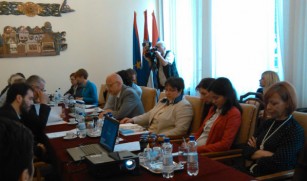International Ombud Meeting in Novi Sad: Welfare Services Under Pressure of Population Ageing and Poverty
 The biggest problem in accessing welfare system services and exercising the rights of its beneficiaries is population ageing on one side, as well as progressing poverty of socially vulnerable groups on the other, especially in rural areas. This was one of the issues discussed at today's regional ombud meeting in Novi Sad. The meeting of representatives of human rights protector's institutions from Bosnia and Herzegovina, Croatia, Hungary and Romania with the Provincial Protector of Citizens - Ombudsman (PPCO), the organizer and host of the event, was held in the light of the 2017 being declared a Welfare and Intergenerational Collaboration Year in the Autonomous Province of Vojvodina.
The biggest problem in accessing welfare system services and exercising the rights of its beneficiaries is population ageing on one side, as well as progressing poverty of socially vulnerable groups on the other, especially in rural areas. This was one of the issues discussed at today's regional ombud meeting in Novi Sad. The meeting of representatives of human rights protector's institutions from Bosnia and Herzegovina, Croatia, Hungary and Romania with the Provincial Protector of Citizens - Ombudsman (PPCO), the organizer and host of the event, was held in the light of the 2017 being declared a Welfare and Intergenerational Collaboration Year in the Autonomous Province of Vojvodina.
The meeting was held as one of the PPCO Collegium sessions, the aim of which is to discuss current human rights affairs with representatives of peer institutions, experts and research-involved public striving for improvement of conditions for citizens' human rights exercise and protection. Special attention during this meeting has been paid to advancing accessibility of welfare, healthcare and other forms of institutional protection for the elderly, people with disabilities, as well as other welfare beneficiaries.
After the introductory address of Prof. Zoran Pavlovic, SJD, the Provincial Protector of Citizens - Ombudsman, the representatives of the guest ombud institutions from the region also presented the legal and institutional framework of their countries' welfare systems, as well as the issues the citizens of these countries addressing the ombud institutions had been facing. Along with PPCO Deputies Aniko Sirkova and Eva Vukasinovic, as well as PPCO associates involved in handling citizens' complaints, the participants of the meeting were Prof. Ljubinko Mitrovic, SJD, Ombudsman of Bosnia and Herzegovina, Prof. Erzsebet Sandor-Szalay, SJD, National Minority Rights Ombudswoman and a Deputy Commissioner for Fundamental Rights of the Republic of Hungary and Timea Csikos, SJD, a Legal Adviser with the same Institution. Romania was represented by Roxana Marcu, the Coordinator of the Timisoara Regional Office of the Romanian Ombudsman, while the Croatian Ombudsman was represented by Teodora Matej, Human Rights Promotion, Cooperation and PR Advisor with the Institution.
Based on the attending ombud institutions' presentations, one of its conclusions was that problems concerning provision of welfare and healthcare services to the elderly, people with disabilities and other vulnerable social groups, as well as the general population, were common to all states in the region represented at today's meeting. Demography-related problems as a consequence of population ageing and emigration of the youth had also been considered, along with the limited capacities of welfare services and institutions to provide for adequate human rights protection of the elderly and people with disabilities. The need for paliative care is also ever more evident with such services, rural areas being particularly negatively affected in this respect.
It is expected that regular meetings such as this one, providing for experience-sharing among ombud institutions in the region, would contribute to more efficient processing of citizens' complaints in the field of welfare, as well as pension and disability insurance, requiring action of peer institutions from two or more neighboring countries. The following regional ombud meeting has been tentatively scheduled for the first week of April 2018, while the initiative of the PPCO regarding drafting a joint project of these institutions concerning their own and other independent human rights protection mechanisms' capacity-building and aimed at facilitating social inclusion of vulnerable groups has been considered welcome by all meeting participants.
The meeting ended with a visit to the Novi Sad Home for the Elderly, where the guests had an opportunity to learn more about the organization, work and challenges of one of the biggest welfare institutions in the Autonomous Province of Vojvodina.





